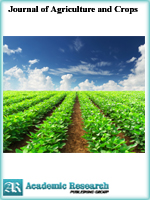Journal of Agriculture and Crops
Online ISSN: 2412-6381
Print ISSN: 2413-886X
Print ISSN: 2413-886X
Quarterly Published (4 Issues Per Year)

Archives
Volume 4 Number 6 June 2018
Allocative and Technical Efficiencies Among Small Holder Cocoyam Farmers in Cross River State Central Agricultural Zone, Nigeria
Authors: Ettah Otu I. ; Ani Stella O.
Pages: 68-72
Abstract
The authors investigated the allocative and technical efficiencies of resources used in cocoyam production among small scale farmers in Central Agricultural Zone of Cross River State, Nigeria. The objectives of the study were to: determine the allocative efficiency of resources used in cocoyam production in the area and determine also the technical efficiency of resources used in cocoyam production in the area. Primary data were used to conduct the study. Statistical tools employed were allocative efficiency index (AEI) and stochastic frontier production function (SFPF). Results of the allocative efficiency index showed that farm size (x1), fertilizer (x3) and herbicide (x5) were all found to be grossly underutilized since their allocative efficiency index were greater than one (1) and their marginal value product (MVP) were greater than their marginal factor cost (MFC). However, Labour (x2) alone was over-utilized. The following were recommended cocoyam farmers are advised to improve on their use of farm resources like land, fertilizer, herbicide and seeds as they were found to be under-utilized and labour should be controlled in such a way that it can be used in other farm enterprises.
Farmers Perceptions and Attitudes Towards the Use of Agricultural Indigenous Knowledge in Farming
Authors: Francis Yao Anyan
Pages: 63-67
Abstract
Attitudes can be strong predictors of behaviours or the acceptance of ideas. The study therefore investigated the attitude of small scale farmers towards the use of Agricultural Indigenous knowledge in their farming activities. Using multistage sampling techniques involving simple random and snow sampling techniques 185 respondents were selected from eight communities in the district. Data was collected using questionnaire and analyzed using both descriptive and inferential statistical analysis. The results show that farmers have positive attitude towards the use of Agricultural Indigenous Knowledge (AIK) in their farming. The study also indicated that gender and age have significant effect on the attitude of farmers towards the use AIK however education has no significant effect.



